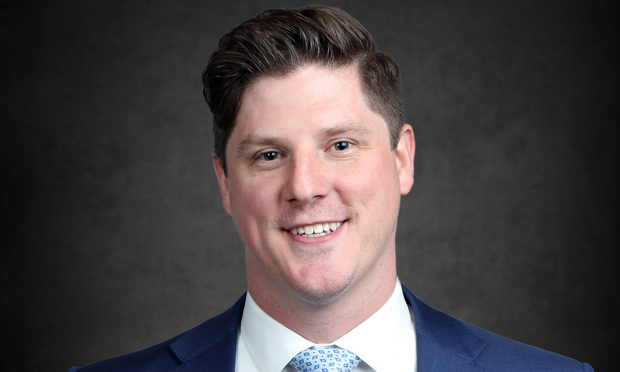Morgan & Morgan's Filing Against Granny Nannies Will Test Florida Employer Liability for Staff's Alleged Actions
At the time of hire, the complaint alleges that home health aide Curtel Hayes had a criminal record of aggravated assault and child neglect.
May 13, 2020 at 02:31 PM
3 minute read
 Aaron Garnett, attorney with Morgan & Morgan's Business Trial Group in Orlando.
Aaron Garnett, attorney with Morgan & Morgan's Business Trial Group in Orlando.
Plaintiff Dorothy Overk, 94 years old, is suing Granny Nannies for failing to perform an appropriate investigation of a caregiver, Curtel Hayes, whom she accused of exploiting her and stealing nearly $140,000 over a two-year span.
Her lawyer, Aaron Garnett, an Orlando attorney with Morgan & Morgan's Business Trial Group, filed the case in the Alachua County Circuit Court on behalf of Overk and her guardian, Mary Yeomans.
"Granny Nannies violated our client's family trust and must be held accountable," Garnett said. "We want to deter this type of conduct in the future to make sure it doesn't happen again to another family."
The complaint quotes from a section of the Granny Nannies website that asks: "How do you recruit and screen your caregivers?" In response, Granny Nannies claimed it looks for and screens certified nursing assistants and home health aides. "All caregivers are thoroughly screened through stringent checks of their credentials, criminal background, work references, and physical condition, they must display the kindness and compassion needed to care for others."
Read the complaint:
At the time of hire, the complaint alleges that Hayes had a criminal record of aggravated assault and child neglect. A February 2020 arrest report prepared by the Gainesville Police Department states that Hayes was stopped by an Alachua County Sheriff's Office deputy Feb. 6, driving a Toyota Highlander that the suspect purchased for around $48,000 using one of Overk's checks.
The arrest report states that Hayes faces charges of grand theft of property valued over $100,000 and exploitation of an elderly or disabled adult.
Background check failure?
Jeffrey H. Traynham, a lawyer for Granny Nannies who will not represent the company in court, appears to place the blame on the state.
"For all caregivers, Granny Nannies does a background check and verifies their eligibility to work in this field through the state of Florida, which makes the determination if they're eligible or ineligible."
According to Traynham, applicants seeking a position as a caregiver are subject to digital fingerprinting that is then vetted through the FBI's national database for verification and background check. Then the company submits the digital fingerprints to the state's Agency for Healthcare Administration. The agency makes a determination of whether an applicant is eligible or ineligible for employment as a caregiver.
"That verification back in 2017," Traynham said, "was verified every quarter and is now a continuous process done by the Agency for Health Care Administration to issue a notification of ineligibility if anything triggers their systems to make someone ineligible."
Harris Solomon, a partner specializing in business litigation and employment law at Brinkley Morgan in Fort Lauderdale who is not involved in the case, says it could be possible for a potential hire to get around a background check.
"Complicated fraud happens all the time in this state just as everywhere else," Solomon said.
This content has been archived. It is available through our partners, LexisNexis® and Bloomberg Law.
To view this content, please continue to their sites.
Not a Lexis Subscriber?
Subscribe Now
Not a Bloomberg Law Subscriber?
Subscribe Now
NOT FOR REPRINT
© 2025 ALM Global, LLC, All Rights Reserved. Request academic re-use from www.copyright.com. All other uses, submit a request to [email protected]. For more information visit Asset & Logo Licensing.
You Might Like
View All
Attorneys, Health Care Officials Face Nearly $80M RICO Suit Over Allegedly Fabricated Spreadsheet


Amid Growing Litigation Volume, Don't Expect UnitedHealthcare to Change Its Stripes After CEO's Killing
6 minute read
Freeman Mathis & Gary Taps Orlando for Third New Florida Office This Year
3 minute readLaw Firms Mentioned
Trending Stories
- 1'A Death Sentence for TikTok'?: Litigators and Experts Weigh Impact of Potential Ban on Creators and Data Privacy
- 2Bribery Case Against Former Lt. Gov. Brian Benjamin Is Dropped
- 3‘Extremely Disturbing’: AI Firms Face Class Action by ‘Taskers’ Exposed to Traumatic Content
- 4State Appeals Court Revives BraunHagey Lawsuit Alleging $4.2M Unlawful Wire to China
- 5Invoking Trump, AG Bonta Reminds Lawyers of Duties to Noncitizens in Plea Dealing
Who Got The Work
J. Brugh Lower of Gibbons has entered an appearance for industrial equipment supplier Devco Corporation in a pending trademark infringement lawsuit. The suit, accusing the defendant of selling knock-off Graco products, was filed Dec. 18 in New Jersey District Court by Rivkin Radler on behalf of Graco Inc. and Graco Minnesota. The case, assigned to U.S. District Judge Zahid N. Quraishi, is 3:24-cv-11294, Graco Inc. et al v. Devco Corporation.
Who Got The Work
Rebecca Maller-Stein and Kent A. Yalowitz of Arnold & Porter Kaye Scholer have entered their appearances for Hanaco Venture Capital and its executives, Lior Prosor and David Frankel, in a pending securities lawsuit. The action, filed on Dec. 24 in New York Southern District Court by Zell, Aron & Co. on behalf of Goldeneye Advisors, accuses the defendants of negligently and fraudulently managing the plaintiff's $1 million investment. The case, assigned to U.S. District Judge Vernon S. Broderick, is 1:24-cv-09918, Goldeneye Advisors, LLC v. Hanaco Venture Capital, Ltd. et al.
Who Got The Work
Attorneys from A&O Shearman has stepped in as defense counsel for Toronto-Dominion Bank and other defendants in a pending securities class action. The suit, filed Dec. 11 in New York Southern District Court by Bleichmar Fonti & Auld, accuses the defendants of concealing the bank's 'pervasive' deficiencies in regards to its compliance with the Bank Secrecy Act and the quality of its anti-money laundering controls. The case, assigned to U.S. District Judge Arun Subramanian, is 1:24-cv-09445, Gonzalez v. The Toronto-Dominion Bank et al.
Who Got The Work
Crown Castle International, a Pennsylvania company providing shared communications infrastructure, has turned to Luke D. Wolf of Gordon Rees Scully Mansukhani to fend off a pending breach-of-contract lawsuit. The court action, filed Nov. 25 in Michigan Eastern District Court by Hooper Hathaway PC on behalf of The Town Residences LLC, accuses Crown Castle of failing to transfer approximately $30,000 in utility payments from T-Mobile in breach of a roof-top lease and assignment agreement. The case, assigned to U.S. District Judge Susan K. Declercq, is 2:24-cv-13131, The Town Residences LLC v. T-Mobile US, Inc. et al.
Who Got The Work
Wilfred P. Coronato and Daniel M. Schwartz of McCarter & English have stepped in as defense counsel to Electrolux Home Products Inc. in a pending product liability lawsuit. The court action, filed Nov. 26 in New York Eastern District Court by Poulos Lopiccolo PC and Nagel Rice LLP on behalf of David Stern, alleges that the defendant's refrigerators’ drawers and shelving repeatedly break and fall apart within months after purchase. The case, assigned to U.S. District Judge Joan M. Azrack, is 2:24-cv-08204, Stern v. Electrolux Home Products, Inc.
Featured Firms
Law Offices of Gary Martin Hays & Associates, P.C.
(470) 294-1674
Law Offices of Mark E. Salomone
(857) 444-6468
Smith & Hassler
(713) 739-1250






